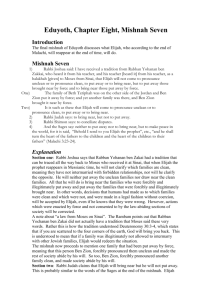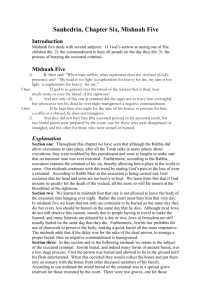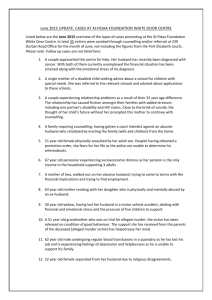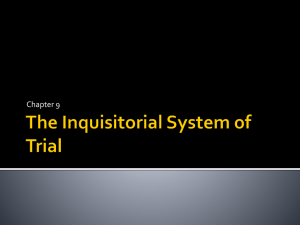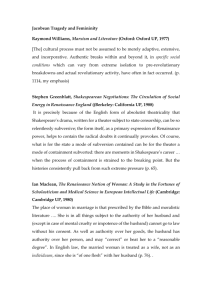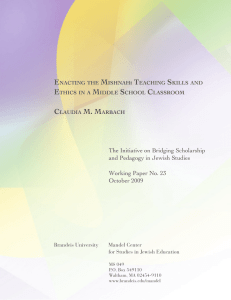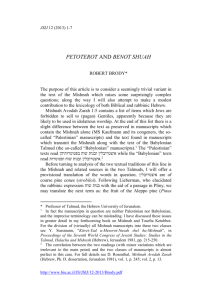Introduction to Tractate Makkoth
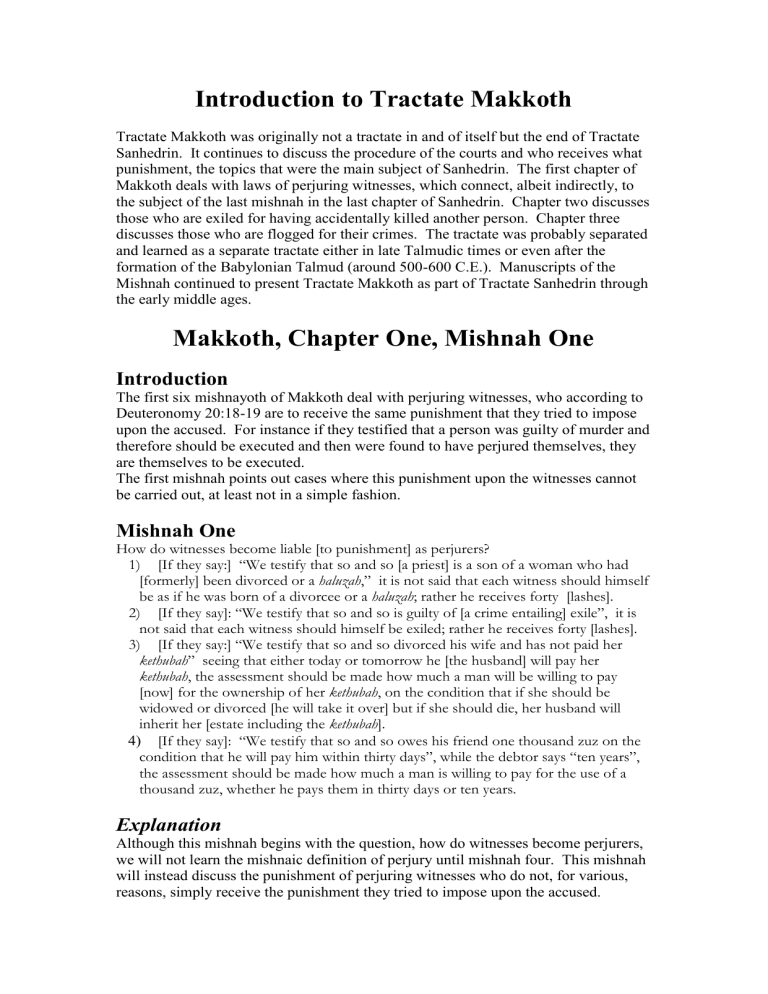
Introduction to Tractate Makkoth
Tractate Makkoth was originally not a tractate in and of itself but the end of Tractate
Sanhedrin. It continues to discuss the procedure of the courts and who receives what punishment, the topics that were the main subject of Sanhedrin. The first chapter of
Makkoth deals with laws of perjuring witnesses, which connect, albeit indirectly, to the subject of the last mishnah in the last chapter of Sanhedrin. Chapter two discusses those who are exiled for having accidentally killed another person. Chapter three discusses those who are flogged for their crimes. The tractate was probably separated and learned as a separate tractate either in late Talmudic times or even after the formation of the Babylonian Talmud (around 500-600 C.E.). Manuscripts of the
Mishnah continued to present Tractate Makkoth as part of Tractate Sanhedrin through the early middle ages.
Makkoth, Chapter One, Mishnah One
Introduction
The first six mishnayoth of Makkoth deal with perjuring witnesses, who according to
Deuteronomy 20:18-19 are to receive the same punishment that they tried to impose upon the accused. For instance if they testified that a person was guilty of murder and therefore should be executed and then were found to have perjured themselves, they are themselves to be executed.
The first mishnah points out cases where this punishment upon the witnesses cannot be carried out, at least not in a simple fashion.
Mishnah One
How do witnesses become liable [to punishment] as perjurers?
1) [If they say:] “We testify that so and so [a priest] is a son of a woman who had
[formerly] been divorced or a haluzah,” it is not said that each witness should himself be as if he was born of a divorcee or a haluzah; rather he receives forty [lashes].
2) [If they say]: “We testify that so and so is guilty of [a crime entailing] exile”, it is not said that each witness should himself be exiled; rather he receives forty [lashes].
3) [If they say:] “We testify that so and so divorced his wife and has not paid her
kethubah” seeing that either today or tomorrow he [the husband] will pay her
kethubah, the assessment should be made how much a man will be willing to pay
[now] for the ownership of her kethubah, on the condition that if she should be widowed or divorced [he will take it over] but if she should die, her husband will inherit her [estate including the kethubah].
4) [If they say]: “We testify that so and so owes his friend one thousand zuz on the condition that he will pay him within thirty days”, while the debtor says “ten years”, the assessment should be made how much a man is willing to pay for the use of a thousand zuz, whether he pays them in thirty days or ten years.
Explanation
Although this mishnah begins with the question, how do witnesses become perjurers, we will not learn the mishnaic definition of perjury until mishnah four. This mishnah will instead discuss the punishment of perjuring witnesses who do not, for various, reasons, simply receive the punishment they tried to impose upon the accused.
Section one : According to Jewish law a kohen (a priest) is not allowed to marry a divorcee or a woman who had undergone the process known as “ halitzah
”, the refusal of the levirate marriage (marriage to the husband’s brother upon the husband’s death when he had no children, see Deuteronomy 25:5-10). A child born of the union of a priest and a divorcee or a halutzah loses his priestly status. If witnesses falsely testify that a priest is really the son of a divorcee or a halutzah, they are attempting to cause him to forfeit his status. Although in general a perjuring witness is punished with the punishment which he tried to impose, in this case it is impossible to do so. Rather he is punished by being lashed forty times (Deuteronomy 25:3).
Section two : If witnesses falsely testify that another person committed a crime which entails exile (we will learn which crimes entail exile in chapter two), the perjuring witnesses are not themselves exiled. Rather they received forty lashes.
Section three : If a person falsely testifies that a man divorced his wife and did not pay her kethubah (marriage settlement) it does not make sense to punish him with a fine equal to the kethubah . Since if the husband should in the future divorce his wife or die and then have to pay the kethubah in any case, by falsely testifying now the perjuring witness didn’t necessarily cause the husband the loss of the kethubah .
Rather we assess how much a person would want to pay to take a risk on buying the woman’s kethubah , on condition that if she would be divorced or widowed he would get the kethubah but if she should die before her husband he would not get the kethubah (since the husband inherits his wife). This is what he kethubah is worth at the present moment, while she and her husband are still alive, and this is what the perjuring witnesses therefore have to pay.
Section four : In this scenario the witnesses falsely testify that a certain person borrowed a thousand zuz and must pay them back within thirty days. The accused does owe the thousand zuz but must pay them back only within ten years and not thirty days. Again, in this case we cannot merely fine the perjurers one thousand zuz since in the end the accused will have to pay back the zuz. Rather the witnesses tried to cause him to lose ten years minus thirty days use of the money, and they are therefore fined whatever a person would pay to use one thousand zuz for ten years minus thirty days.





